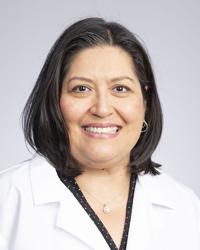Women's Preventive Health: 6 Screenings for Early Detection
July 6, 2023
Categories: Women's Health, Obstetrics & Gynecology

From adolescence to your childbearing years, menopause and beyond, preventive care is essential. An annual visit is the best time to make sure you’re up to date on your recommended preventive screenings.
“Women tend to be caregivers and don’t always take care of themselves as well as they should,” says Loyola Medicine obstetrician and gynecologist (OB/GYN) Sandra Vega, MD. “Making time for routine preventive care can improve your overall health and longevity.”
The importance of an annual well-woman exam for preventive health
Meet OB/GYN Sandra Vega, MD.
Preventive screenings for women
Several organizations develop screening recommendations for disease prevention. As an OB/GYN, Dr. Vega follows guidelines from the American College of Obstetricians and Gynecologists (ACOG). While most screening guidelines are consistent across organizations, they sometimes differ.
“Personalized care means the recommendations are a starting point,” says Dr. Vega. “I pay close attention to a patient’s medical and family history. I am always open to having a conversation with the patient to tailor screening based on their unique situation.”
The six preventive screenings Dr. Vega recommends include:
1. Breast cancer screening
Breast cancer screening can find cancer early, when it is most treatable. For women with average risk, Dr. Vega advises an annual mammogram to screen for breast cancer starting at age 40.
If you have a family history, known genetic risk or other risk factors, talk to your doctor about specific recommendations.
2. Cervical cancer screening and HPV vaccination
The guidelines for cervical cancer screening have changed. In the past, providers performed Pap tests annually. The current recommendation is to begin Pap tests at age 21. If the test result is negative, follow-up Pap testing varies by age:
- Ages 21 to 30: Follow-up Pap in three years
- Ages 30 to 65: Follow-up Pap in three to five years
- Age 65 and older: No follow-up screening is needed after adequate negative prior screenings
The main cause of cervical cancer is human papillomavirus (HPV). Since 2006, the HPV vaccine has been available for children starting as early as age nine and up to age 26. In 2019, the Centers for Disease Control and Prevention extended the upper age limit for HPV vaccination to age 45. If you think you are at risk for a new HPV infection, talk to your doctor, says Dr. Vega.
3. Sexually Transmitted Infection (STI) screening
If you are sexually active, your provider may recommend STI screening if you are under age 25 or have an increased risk. Factors that increase your STI risk include:
- Having a new partner, multiple sex partners, a sex partner who has other partners, or a sex partner who has an STI
- Not consistently using a condom if your relationship is not mutually monogamous
4. Colon cancer screening
In 2021, the U.S. Preventative Services Task Force issued a new recommendation that lowered the age of colon cancer screening for people at average risk from 50 to 45. This change was based on the trend of growing cases among younger adults. Screening options include a home test kit or colonoscopy. Your doctor can help you decide what test is right for you. After your first test, the follow-up screening frequency depends on the type of test and your results.
5. Osteoporosis screening
Osteoporosis is a condition that causes a loss in bone density which increases your risk of a bone break. It is most common in women over age fifty. A bone density test, also called a DEXA, is a type of X-ray that measures the strength of your bones. “We typically recommend bone density testing beginning at age 65,” says Dr. Vega. “We base the frequency of tests after on your results and whether you need treatment.”
6. Depression screening
An important component of your annual wellness exam is depression screening. This quick questionnaire assesses how you are feeling. Depending on how you respond, your provider may give you a more in-depth survey.
These screening tools help your provider learn more about your mental health and determine the next steps if you are experiencing depression.
What to expect at your annual well-woman exam
Even though you won’t have every screening every year, you should still have an annual wellness exam. This visit assesses your complete health and typically includes:
- Physical assessment, which may include a pelvic and breast exam
- Review of your health history, family history, medications and immunizations
- Tobacco, alcohol and drug use assessments
- Vital signs, such as temperature, pulse and blood pressure
- Weight check
Your provider may also ask you about women’s health issues such as pregnancy, birth control, menopause and urinary incontinence.
Women’s health vs. primary care providers
Whether you receive your women’s health care from a primary care provider or an OB/GYN is your choice. Some primary care providers offer one-stop care that includes women’s health services.
If your primary care provider doesn’t provide those services, they will refer you to an OB/GYN. You may also receive a referral to an OB/GYN if you have any health concerns, such as irregular bleeding or pelvic pain.
Dr. Vega says that finding a provider you feel comfortable with and making the most of your annual well-woman exam is essential. “I tell my patients to make a list of the things they want to discuss,” she says. “When patients are open, honest and know what they want, it helps me provide personalized care.”
OB/GYN care at Loyola Medicine
Loyola Medicine’s OB/GYN providers approach women’s health comprehensively. They perform wellness visits and coordinate your screening imaging or lab tests. Learn about well-woman care at Loyola Medicine.
Using myLoyola, you can access test results and educational materials from your provider. Your OB/GYN can quickly and seamlessly connect you with a Loyola specialist if you need additional care.
Loyola obstetrics and gynecology offices are conveniently located throughout Chicago’s western and southwestern suburbs. To make an appointment, call 888-584-7888 or schedule an appointment online.
Sandra Vega, MD, is a board-certified obstetrician/gynecologist at Loyola Medicine. Dr. Vega received her medical degree from the University of Illinois College of Medicine and completed her residency at Mercy Hospital and Medical Center.
Dr. Vega provides routine obstetric and gynecologic care across the lifespan. She also specializes in treating menstrual irregularities and other gynecological problems and has extensive experience in robotic surgery. Dr. Vega enjoys educating women and empowering them to take care of themselves.
Book an appointment today to see Dr. Vega or another OB/GYN specialist by self-scheduling an in-person or virtual appointment using myLoyola.
